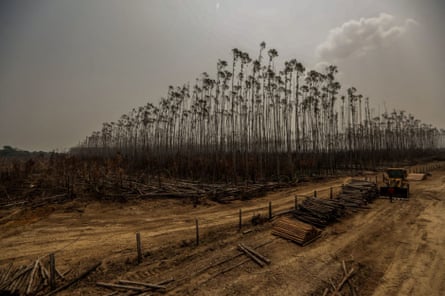Monoculture tree-planting schemes are threatening tropical biodiversity while only offering modest climate benefit, ecologists have said, warning that ecosystems like the Amazon and Congo basin are being reduced to their carbon value.
Amid a boom in the planting of single-species plantations to capture carbon, scientists have urged governments to prioritise the conservation and restoration of native forests over commercial monocultures, and cautioned that planting swathes of non-native trees in tropical regions threatens important flora and fauna for a negligible climate impact.
Writing in the journal Trends in Ecology & Evolution, ecologists said the increasing popularity of commercial pine, eucalyptus and teak plantations in the tropics for carbon offsetting is having unintended consequences, such as drying out native ecosystems, acidifying soils, crowding out native plants and turbocharging wildfires.
“Despite the broad range of ecosystem functions and services provided by tropical ecosystems, society has reduced the value of these ecosystems to just one metric – carbon,” the paper reads. “It is broadly assumed that maximising standing carbon stocks also benefits biodiversity, ecosystem function and enhances socioeconomic co-benefits – yet this is often not the case.”
Tree-planting has been held up as an important tool in mitigating global heating, with dozens of public and private initiatives under way to rapidly increase forest cover around the world to meet net zero goals. However, research indicates that the environmental benefit is heavily dependent on the scale and type of restoration, and requires huge areas of land. One 2019 study estimated that allowing natural forests to regenerate could return 40 times as much carbon as plantations.
Jesús Aguirre-Gutiérrez, an ecologist at the University of Oxford who led the paper, said the scientists decided to say something after witnessing the increase in commercial plantations in the tropics.
‘Tree-planting should not be seen as an alternative to rapidly cutting fossil fuel emissions,’ said Simon Lewis from University College London. Photograph: Gabriela Biro/Alamy
“We carry out a lot of fieldwork in the tropics to research what is happening with climate change and we have seen the boom in these plantations for ourselves: teaks, conifer and eucalyptus, just one or two species,” he said. “These schemes are a win for the company planting these trees but not for biodiversity. This is the start of this phenomenon, hence the seriousness of the situation.”
The paper estimates that a plantation across the combined size of the US, China, Russia and the UK would have to be planted in order to sequester one year of emissions.
While plantations are often more economically viable than standing forests, the paper highlights that they often support a lower level of biodiversity. For example, in the Brazilian Cerrado savanna, a 40% rise in woodland cover reduced the diversity of plants and ants by about 30%.
Simon Lewis, a professor of Global Change Science at University College London, said it was dangerous to treat trees as “nothing more than sticks of carbon”.
“Of course, plantations are needed for the paper and wood products society needs, but rebadging industrial plantations as carbon offsets is yet another problem of the … unregulated carbon offsets market. Tree-planting should not be seen as an alternative to rapidly cutting fossil fuel emissions,” he said.
Thomas Crowther, a professor of ecology at ETH Zurich, who co-authored a paper that found there are 900m hectares (2.2bn acres) of land outside urban and agricultural areas suitable for forests, said placing the carbon value of an ecosystem above everything else was wrong.
“Whenever we value one part of nature more than everything else, we incentivise the propagation of that part at the expense of everything else,” he said. “Historically, we have valued the parts that we use for food, timber, medicines etc, but now we are doing the same thing with carbon.”
www.theguardian.com
https://www.theguardian.com/environment/2023/oct/03/carbon-tree-planting-schemes-threaten-tropical-biodiversity-aoe













